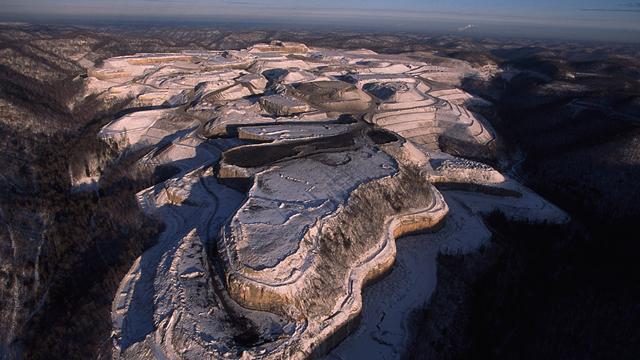
Photo: Coal Country
Students from Swarthmore and Earlham College traveled to Appalachia this week as part of the Divest Coal Frontlines Listening Tour, which is the latest effort in a broader campaign calling on all colleges and universities to divest from the largest and most destructive U.S.-based fossil fuel companies. Arriving in West Virginia in time for the Mountain Mobilization — a regional gathering July 25 through August 1 that will culminate in direct action on a proposed mine site — the tour is meant to facilitate collaboration by connecting the divestment campaigns with groups that have been organizing against mountaintop removal coal mining in Appalachia for the past several decades.
Mountaintop removal (MTR) is just what it sounds like — a process in which the tops of mountains are exploded to reveal the coal seams underneath. Anti-coal activist and lifelong West Virginia resident Larry Gibson describes the practice as “raising the dead, while burying the living.” This method is less labor-intensive, and thus more profitable to mining companies, than underground mining. In regions where it is practiced, MTR results in poisoned water, deadly health impacts and economically devastated communities.
Engagement with environmental issues is nothing new for many colleges. Student-led initiatives have driven down institutional energy consumption in the past 10 years, placed wind turbines on campuses and taken coal-fired power plants off of them. While these efforts continue, students across the country are turning to divestment as a new means to confront the coal, oil and gas industries. Campaigns are currently being waged at Swarthmore, Earlham, UNC-Chapel Hill, University of Illinois-Urbana-Champaign, Cornell and Colby, with another six campuses planning to join in the fall.
In forming relationships with organizations on the frontlines of the struggle against MTR, students hope to more effectively act in solidarity with these groups and weave divestment, both symbolically and materially, into an ecology of resistance against the fossil fuel industry. Although it may be just a small part of the ongoing movement for climate justice, college divestment campaigns add a new element of strategy to the work being done to combat climate change.
By asking for divestment, students implicate universities in the destructive practices of the global economy, calling into question their positions as actors in an increasingly myopic financial industry. Like the corporations they invest in, university finance managers look for returns on a quarterly, not long-term basis. Such thinking paints coal, oil and natural gas as sound investments based on solid short-term financial returns, while failing to consider their negative long-term returns: poisoned watersheds, toxic ecosystems and devastated communities.
Divestment also carries a symbolic weight that challenges us to reconsider fossil fuel extraction and climate change as human rights issues. For many, the word divestment brings to mind the mass movement to divest from South African apartheid in the 1970s and 80s. More recently, divestment campaigns have drawn attention to human rights crises in Sudan and Palestine, as well as workplaces in the U.S. Calling for divestment from fossil fuels inevitably highlights these connections, and creates an opening to talk about the ways that climate change disproportionately affects poor communities, women and communities of color. Furthermore, it places the blame for the economic violence of climate change squarely on the companies that fuel it, rather than on those consumers who can’t afford to “buy green.”
Even though no schools have committed to coal or fossil fuel divestment yet, students say divestment campaigns have already proven effective as an educational device. “One year into our campaign, mountaintop removal has become a pressing issue at Swarthmore,” said student organizer Ali Roseberry-Polier. “It keeps coming up in unrelated contexts. For example, a professor made MTR the central moral issue in his Baccalaureate speech. This would not have happened before our campaign.”
History shows that ambitious campaigns can have a ripple effect beyond their immediate goals. For instance, many credit the noise and heat generated by apartheid divestment campaigns as a major factor spurring the U.S. government to apply sanctions to South Africa. “Even though our ultimate goal is to win divestment,” Roseberry-Polier explained, “we count increased awareness as a success, because it builds support for the movement that’s happening in Appalachia and other frontline communities.”
This is not to suggest that the goal of divestment is merely about raising awareness. Taking university money out of fossil fuels has the potential to morally and economically taint the dirty energy sector in the world of finance. Fossil fuel divestment from colleges like UNC and Cornell, whose endowments alone account for $7.5 billion, will send a message to not just the companies they’re divesting from, but to the investment firms who manage their holdings — firms that also handle the investments of other large institutional investors. Beyond sanctioning extraction, divesting can begin to correct to the feckless nature of finance culture, both inside and outside of the university.
With the fossil fuel divestment movement still in its fledgling stages, much more organizing, agitation and direct action will be necessary to overcome the inertia of university finance. The Listening Tour is the next step in that progression, helping student activists build connections within the environmental justice movement and further draw attention to the complex ties that enable environmental destruction. By doing so, they may yet succeed in building a similarly complex resistance.
3 WAYS TO SHOW YOUR SUPPORT
- Log in to post comments












